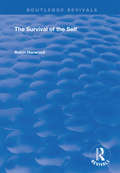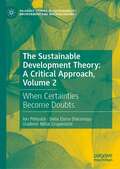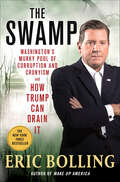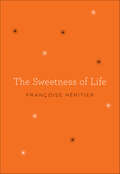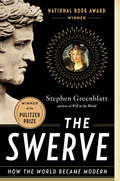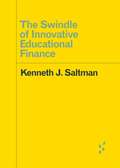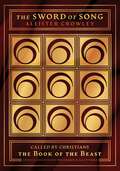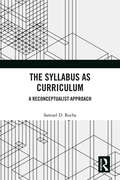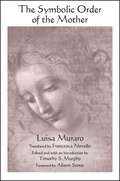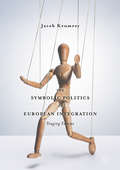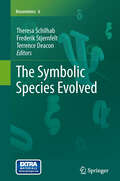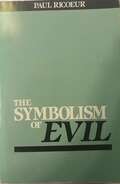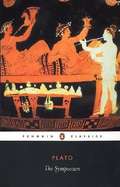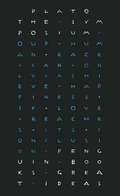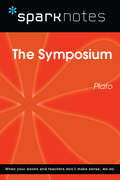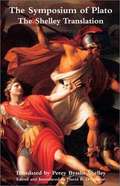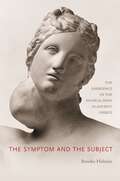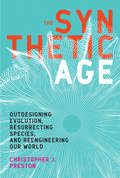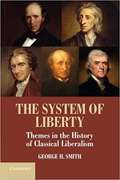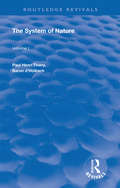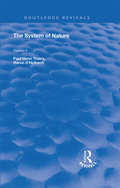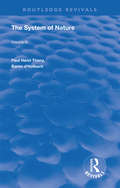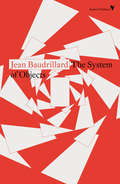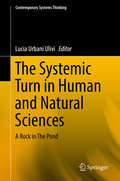- Table View
- List View
The Survival of the Self (Routledge Revivals)
by Robin HarwoodFirst published in 1998, this volume gives an account of personal identity derived from the Butler-Reid position, arguing that from the first person point of view one necessary condition of personal identity is the survival of the Self. Robin Harwood’s claim is that a normal human person is a combination of a Self, a mind and a body, locating the issue of personal identity as stemming from the nature of persons as compound entities.
The Sustainable Development Theory: When Certainties Become Doubts (Palgrave Studies in Sustainability, Environment and Macroeconomics)
by Ion Pohoaţă Delia Elena Diaconaşu Vladimir Mihai CrupenschiThis book explores the present conflictual relationship between the economy, the environment, and society. The current mainstream economic model is analysed from the perspective of the founding economists to review its suitability to tackle issues of sustainable development. The problems of redistribution and social justice are debated at length; alongside those concerning the giant state, degrowth, and a vision of sustainability that is founded on the idea of a self-regulating free market economy. Business cycle sustainability, anti-crisis therapy, technological unemployment, the natural rate of interest, and the Bruntland matrix are also examined.This book aims to present a holistic approach to sustainable development where social, ecological, and economic components are balanced. It will be relevant to students and researchers interested in this topic.
The Swamp: Washington's Murky Pool of Corruption and Cronyism and How Trump Can Drain It
by Eric BollingHow Donald Trump can clear up political misconduct and corruption from the New York Times–bestselling author of Wake Up America.When Washington D.C. was first built, it was on top of a swamp that had to be drained. Donald Trump says it’s time to drain it again.In The Swamp, bestselling author and Fox News Channel host Eric Bolling presents an infuriating, amusing, revealing, and outrageous history of American politics, past and present, Republican and Democrat. From national political scandals to tempests in a teapot that blew up; bribery, blackmail, bullying, and backroom deals that contradicted public policies; cronyism that cost taxpayers hundreds upon hundreds of millions of dollars; and personal conduct that can only be described as regrettable, The Swamp is a journey downriver through the bayous and marshes of Capitol Hill and Foggy Bottom.The presidential election of 2016 was ugly, but it exposed a political, media, industry, and elite establishment that desperately wanted to elect a politician who received millions of dollars from terror-funding states over a businessman willing to tell the corrupt or incompetent, “You’re fired.”The book concludes with a series of recommendations for President Trump: practical, hard-headed, and concise ways to drain the swamp and force Washington to be more transparent, more accountable, and more effective in how it serves those who have elected its politicians and pay the bills for their decisions.Last year President Trump declared Wake Up America to be a “huge” book; Eric Bolling’s second book is sure to build on that success. Entertaining and timely, The Swamp is the perfect book for today’s political climate.
The Sweetness of Life
by Françoise HéritierFrançoise Héritier’s international bestseller The Sweetness of Life is a celebration of the small, sweet moments that make life worth living—and the importance of taking the time to savor them.Busy juggling so many responsibilities in our overextended lives, we often miss the precious experiences that are pure joy and the actual experience of humanity: wild laughter, phone calls with loved ones, coffee in the sun, crisp fall evenings, running in warm rain, long conversations at twilight, cooking and savoring a good meal, watching a craftsman at work, getting together with friends we’ve missed.In this enchanting book—part letter, part prose poem, part charming and witty self-help guide— anthropologist Françoise Héritier lists with heartwarming and heartbreaking specificity all that we so easily overlook if we do not attend to the lightness and grace in our own lives.Filled with profound insight and down-to-earth wisdom, The Sweetness of Life is the perfect gift to to share with everyone you love.
The Swerve: How The World Became Modern
by Stephen GreenblattWinner of the Pulitzer Prize for Nonfiction • Winner of the National Book Award • New York Times Bestseller Renowned scholar Stephen Greenblatt brings the past to vivid life in what is at once a supreme work of scholarship, a literary page-turner, and a thrilling testament to the power of the written word. In the winter of 1417, a short, genial, cannily alert man in his late thirties plucked a very old manuscript off a dusty shelf in a remote monastery, saw with excitement what he had discovered, and ordered that it be copied. He was Poggio Bracciolini, the greatest book hunter of the Renaissance. His discovery, Lucretius’ ancient poem On the Nature of Things, had been almost entirely lost to history for more than a thousand years. It was a beautiful poem of the most dangerous ideas: that the universe functions without the aid of gods, that religious fear is damaging to human life, that pleasure and virtue are not opposites but intertwined, and that matter is made up of very small material particles in eternal motion, randomly colliding and swerving in new directions. Its return to circulation changed the course of history. The poem’s vision would shape the thought of Galileo and Freud, Darwin and Einstein, and—in the hands of Thomas Jefferson—leave its trace on the Declaration of Independence. From the gardens of the ancient philosophers to the dark chambers of monastic scriptoria during the Middle Ages to the cynical, competitive court of a corrupt and dangerous pope, Greenblatt brings Poggio’s search and discovery to life in a way that deepens our understanding of the world we live in now. “An intellectually invigorating, nonfiction version of a Dan Brown–like mystery-in-the-archives thriller.” —Boston Globe
The Swindle of Innovative Educational Finance (Forerunners: Ideas First)
by Kenneth J. SaltmanHow &“innovative&” finance schemes skim public wealth while hijacking public governanceCharter school expansion. Vouchers. Scholarship tax credit programs. The Swindle of Innovative Educational Finance offers a new social theory to explain why these and other privatization policies and programs win support despite being unsupported by empirical evidence. Kenneth J. Saltman details how, under the guise of innovation, cost savings, and corporate social responsibility, new and massive neoliberal educational privatization schemes have been widely adopted in the United States. From a trillion-dollar charter school bubble to the Chan Zuckerberg Initiative to celebrities branding private schools, Saltman ultimately connects such schemes to the country&’s current crisis of truth and offers advice for resistance. Forerunners is a thought-in-process series of breakthrough digital works. Written between fresh ideas and finished books, Forerunners draws on scholarly work initiated in notable blogs, social media, conference plenaries, journal articles, and the synergy of academic exchange. This is gray literature publishing: where intense thinking, change, and speculation take place in scholarship.
The Sword of Song: Called by Christians The Book of the Beast
by Aleister Crowley• Presents Crowley&’s preferred text, drawing on all existing draft manuscripts and margin notes from Crowley&’s personal copies• Contains an introduction and explanatory notes by Crowley biographer Richard Kaczynski, helping to illuminate obscure passages and references• Includes Crowley&’s mystical essays on his first forays into sex magic, his initial embrace of the legendary title of &“the Beast,&” and his encounters with the Golden Dawn, Buddhism, Agnosticism, and ChristianityToo inflammatory for English publishers, Aleister Crowley printed The Sword of Song, his first talismanic work, in Paris in 1904, releasing a mere one hundred copies. Deconstructing his encounters with the Golden Dawn, Buddhism, Agnosticism, and Christianity, the book explored Crowley&’s magic and spiritual philosophy before he experienced the revelation that led to The Book of the Law. The Sword of Song also contained Crowley&’s first manifesto, his first forays into sex magic, his initial embrace of the legendary title of "the Beast," the occult poem "Ascension Day," and mystical essays.Now in this fully annotated deluxe hardcover edition, renowned Crowley biographer Richard Kaczynski presents Crowley&’s preferred text for The Sword of Song, drawing on all existing draft manuscripts as well as unpublished margin notes from Crowley&’s personal copies of the book. Kaczynski clarifies all the significant changes and additions throughout the book&’s various iterations and provides explanations for the many occult and popular culture references. He also includes a substantial scholarly introduction, reflecting an intimate knowledge of Crowley and the development of his magical practice.Kaczynski demonstrates how The Sword of Song was not only a prototype for Crowley&’s later works such as Konx Om Pax and The Book of Lies, but that The Sword of Song's blend of poetry, allegory, fiction, and essay reveals the formative inner workings of one of the twentieth century&’s most provocative thinkers just before he received the life-changing Book of the Law from the discarnate entity Aiwass.
The Syllabus as Curriculum: A Reconceptualist Approach (Routledge Research in Education)
by Samuel D. RochaCan the syllabus constitute the curriculum? In this volume, Rocha explores curriculum theory through the lens of the syllabus. By critiquing curriculum studies and the entire field of education, overrun by the social sciences, Rocha provides an integrated vision of philosophy of education and curriculum theory, rooted in the humanities. Through an original reconceptualization, this text draws from a broad range of sources – ranging from Classical Antiquity to the present – offering a rich context for understanding curriculum as a philosophically salient concept, contained within the syllabus. The Syllabus as Curriculum features actual syllabi created and taught by the author in undergraduate and graduate courses at the University of British Columbia, Canada. These curated syllabi work as exemplars and media, supported by pedagogical commentary and context. Inspired by Augustine’s Confessions, each part of the book culminates in a metaphorical "garden," which serves as a meditation on the syllabus in three senses: correspondence, essay, and outline. An original, powerful, and corrective contribution to the literature on curriculum studies, this work invites teachers and scholars from across the foundations of education, especially philosophy of education, art education, and those invested in curriculum theory, to see their contribution in more direct and integral ways.
The Symbolic Order of the Mother (SUNY series in Contemporary Italian Philosophy)
by Luisa MuraroIn The Symbolic Order of the Mother Luisa Muraro identifies the bond between mother and child as ontologically fundamental to the development of culture and politics, and therefore as key to achieving truly emancipatory political change. Both corporeal development and language acquisition, which are the sources of all thinking, begin in this relationship. However, Western civilization has been defined by men, and Muraro recalls the admiration and envy she felt for the great philosophers as she strove to become one herself, as well as the desire for independence that opposed her to her mother. This conflict between philosophy and culture on the one hand and the relationship with the mother on the other constitutes the root of patriarchy's symbolic disorder, which blocks women's (and men's) access to genuine freedom. Muraro appeals to the feminist practice of gratitude to the mother and the recognition of her authority as a model of unconditional nurture and support that must be restored. This, she argues, is the symbolic order of the mother that must overcome the disorder of patriarchy. The mediating power of the mother tongue constitutes a symbolic order that comes before all others, for both women and men.
The Symbolic Politics of European Integration
by Jacob KrumreyThis book presents a cultural history of European integration. It revisits the European Community’s postwar origins through the lens of symbolic representation and so reveals a hitherto unknown side to Europe’s notorious technocrats. They were not simply administrators: they were skillful marketing experts, clever spin doctors, and talented stage directors. After all, what made the European Community stand out among the multitude of postwar European organizations? This book argues that it was not so much its vaunted supranationalism, nor its economic significance; it was its self-proclaimed role as torchbearer of European unity. Combining archival research with media analysis, The Symbolic Politics of European Integration reviews Europe’s early parliaments, its early diplomacy, and its long search for “capital cities,” from Strasbourg to Brussels. It tells the story of the political theater that staged an enterprise of technocrats as the embodiment of a Europe united in peace and prosperity. This book is an invaluable resource for historians of postwar Europe, as well as for analysts of today’s EU, who seek to understand how coal, steel, and tariffs became the stuff the European dream was made of.
The Symbolic Species Evolved
by Theresa Schilhab Frederik Stjernfelt Terrence DeaconThis anthology is a compilation of the best contributions from Symbolic Species Conferences I, II (which took place in 2006, 2007). In 1997 the American anthropologist Terrence Deacon published The Symbolic Species: The Coevolution of Language and the Brain. The book is widely considered a seminal work in the subject of evolutionary cognition. However, Deacons book was the first step - further steps have had to be taken. The proposed anthology is such an important associate. The contributions are written by a wide variety of scholars each with a unique view on evolutionary cognition and the questions raised by Terrence Deacon - emergence in evolution, the origin of language, the semiotic 'missing link', Peirce's semiotics in evolution and biology, biosemiotics, evolutionary cognition, Baldwinian evolution, the neuroscience of linguistic capacities as well as phylogeny of the homo species, primatology, embodied cognition and knowledge types.
The Symbolism of Evil
by Paul Ricoeur"According to Ricoeur, the most primal and spontaneous symbols of evil are defilement, sin and guilt ... Ricoeur moves from the elementary symbols of evil into the rich world of myths ... and he ends by suggesting that the clue to the relation between philosophy to mythology is to be found in the aphorism 'The symbol gives rise to the thought' ... Ricoeur's method and argument are too intricate and rich to assess in so short a review. Suffice it to say that this is the most massive accomplisment of any philosopher within the ambience of Christian faith since the appearance of Gabriel Marcel" – Sam Keen, The Christian Century
The Symposium
by Plato Christopher GillIn the course of a lively drinking party, a group of Athenian intellectuals exchange views on eros, or desire. From their conversation emerges a series of subtle reflections on gender roles, sex in society and the sublimation of basic human instincts. The discussion culminates in a radical challenge to conventional views by Plato's mentor, Socrates, who advocates transcendence through spiritual love. <p><p> This book is a deft interweaving of different viewpoints and ideas about the nature of love - as a response to beauty, a cosmic force, a motive for social action and as a means of ethical education. Christopher Gill's translation retains all the drama and humour of the Greek, bringing the historical figures to life. His introduction discusses aspects of classical Athenian life shown in the book and provides thoughtful examinations of the individual speeches.
The Symposium
by PlatoUnfolding in an informal setting, Plato's The Symposium is a powerful discussion on the nature of love, translated from the Greek with notes and an introduction by Christopher Gill in Penguin Classics. In the course of a lively drinking party, a group of Athenian intellectuals exchange views on eros, or desire. From their conversation emerge a series of subtle reflections on gender roles, sex in society and the sublimation of basic human instincts. The discussion culminates in a radical challenge to conventional views by Plato's mentor, Socrates, who advocates transcendence through spiritual love. The Symposium is a deft interweaving of different viewpoints and ideas about the nature of love - as a response to beauty, a cosmic force, a motive for social action and as a means of ethical education. Christopher Gill's translation retains all the drama and humour of Plato's language, bringing the historical figures to life. His introduction discusses aspects of classical Athenian life shown in The Symposium and provides thoughtful examinations of the individual speeches. Plato (c. 427-347 BC) stands with Socrates and Aristotle as one of the shapers of the whole intellectual tradition of the West. He founded the Academy in Athens, the first permanent institution devoted to philosophical research and teaching, and the prototype of all Western universities. If you enjoyed The Symposium, you might like Aristotle's Poetics, also available in Penguin Classics. 'Translated in bright modern English by Christopher Gill'Peter Stothard, The Times
The Symposium (SparkNotes Philosophy Guide)
by Plato SparkNotesThe Symposium (SparkNotes Philosophy Guide) Making the reading experience fun! SparkNotes Philosophy Guides are one-stop guides to the great works of philosophy–masterpieces that stand at the foundations of Western thought. Inside each Philosophy Guide you&’ll find insightful overviews of great philosophical works of the Western world.
The Symposium of Plato: The Shelley Translation
by Percy Bysshe Shelley David K. O'ConnorIn the summer of 1818, Percy Bysshe Shelley pulled himself away from a flurry of other projects to devote himself to translating Plato's Symposium. Besides being one of the very great lyric poets of Romanticism, Shelley was an accomplished Hellenist, and had a natural sympathy for Plato's way of seeing the world. The result of his labor was a translation of Plato's principal work on love that is, in both clarity and felicity of expression, unmatched by any contemporary translation.<p><p> Much of what the dialogue offers to today's reader - namely, its invitation to see erotic experience as the privileged locus of our contact with the sacred and the divine - is lost in translation by failures of tone more than by inaccuracies or simple infelicities. The elevation and sophistication of Shelley's prose makes his translation a much better English vehicle for Plato's writing than the rather chatty and colloquial translations current today. Plato's speeches on love need an English idiom in which myth is at home, and in which humor rises to urbanity rather than descending to mere wit and joke. With Shelley, we get a translation of a great literary masterpiece by a writer who is himself a literary master, and his mastery is of exactly the type required by Plato's text.<p> This translation came at the height of Shelley's powers, mirroring in language and conception some of his finest works, and so is itself a precious document in the history of Romanticism, for which the reappropriation of Plato is second in importance only to the massive influence of Shakespeare. Mary Wollstonecraft Shelley, her husband's literary executor, upon publication of (a somewhat expurgated version of) the dialogue, boasted that "Shelley resembled Plato; both taking more delight in the abstract and the ideal than in the special and the tangible. This did not result from imitation; for it was not till Shelley resided in Italy that he made Plato his study. He then translated his Symposium and Ion; and the English language boasts of no more brilliant composition than Plato's Praise of Love translated by Shelley." If this goes too far, it goes at least in the right direction.
The Symptom and the Subject: The Emergence of the Physical Body in Ancient Greece
by Brooke HolmesThe Symptom and the Subject takes an in-depth look at how the physical body first emerged in the West as both an object of knowledge and a mysterious part of the self. Beginning with Homer, moving through classical-era medical treatises, and closing with studies of early ethical philosophy and Euripidean tragedy, this book rewrites the traditional story of the rise of body-soul dualism in ancient Greece. Brooke Holmes demonstrates that as the body (sôma) became a subject of physical inquiry, it decisively changed ancient Greek ideas about the meaning of suffering, the soul, and human nature. By undertaking a new examination of biological and medical evidence from the sixth through fourth centuries BCE, Holmes argues that it was in large part through changing interpretations of symptoms that people began to perceive the physical body with the senses and the mind. Once attributed primarily to social agents like gods and daemons, symptoms began to be explained by physicians in terms of the physical substances hidden inside the person. Imagining a daemonic space inside the person but largely below the threshold of feeling, these physicians helped to radically transform what it meant for human beings to be vulnerable, and ushered in a new ethics centered on the responsibility of taking care of the self. The Symptom and the Subject highlights with fresh importance how classical Greek discoveries made possible new and deeply influential ways of thinking about the human subject.
The Synthetic Age: Outdesigning Evolution, Resurrecting Species, and Reengineering Our World (The\mit Press Ser.)
by Christopher J. PrestonImagining a future in which humans fundamentally reshape the natural world using nanotechnology, synthetic biology, de-extinction, and climate engineering.We have all heard that there are no longer any places left on Earth untouched by humans. The significance of this goes beyond statistics documenting melting glaciers and shrinking species counts. It signals a new geological epoch. In The Synthetic Age, Christopher Preston argues that what is most startling about this coming epoch is not only how much impact humans have had but, more important, how much deliberate shaping they will start to do. Emerging technologies promise to give us the power to take over some of Nature's most basic operations. It is not just that we are exiting the Holocene and entering the Anthropocene; it is that we are leaving behind the time in which planetary change is just the unintended consequence of unbridled industrialism. A world designed by engineers and technicians means the birth of the planet's first Synthetic Age.Preston describes a range of technologies that will reconfigure Earth's very metabolism: nanotechnologies that can restructure natural forms of matter; “molecular manufacturing” that offers unlimited repurposing; synthetic biology's potential to build, not just read, a genome; “biological mini-machines” that can outdesign evolution; the relocation and resurrection of species; and climate engineering attempts to manage solar radiation by synthesizing a volcanic haze, cool surface temperatures by increasing the brightness of clouds, and remove carbon from the atmosphere with artificial trees that capture carbon from the breeze. What does it mean when humans shift from being caretakers of the Earth to being shapers of it? And in whom should we trust to decide the contours of our synthetic future? These questions are too important to be left to the engineers.
The System of Liberty
by George H. SmithLiberal individualism, or "classical liberalism" as it is often called, refers to a political philosophy in which liberty plays the central role. This book demonstrates a conceptual unity within the manifestations of classical liberalism by tracing the history of several interrelated and reinforcing themes. Concepts such as order, justice, rights, and freedom have imparted unity to this diverse political ideology by integrating context and meaning. However, they have also sparked conflict, as classical liberals split on a number of issues, such as legitimate exceptions to the "presumption of liberty," the meaning of "the public good," natural rights versus utilitarianism, the role of the state in education, and the rights of resistance and revolution. This book explores these conflicts and their implications for contemporary liberal and libertarian thought.
The System of Nature: Volume 1 (Routledge Revivals)
by Paul Henri ThieryOriginally published in 1984. Paul Henri Thiery, Baron d'Holbach (1723-1789), was the center of the radical wing of the philosophers. Holbach wrote, translated, edited, and issued a stream of books and pamphlets, often under other names, that has made him the despair of bibliographers but has connected his name, by innuendo, gossip, and association, with most of what was written in defeense of atheistic materialism in late eighteenth-century France. Holbach is best known for The System of Nature (1770) and deservedly, since it is a clear exposition of his main ideas. His initial position determines all the rest of his argument: 'There is not, there can be nothing out of that Nature which includes all beings.' Conceiving of nature as strictly limited to matter and motion, both of which have always existed, he flatly denies that there is any such thing as spirit or supernatural. This is the first of three volumes.
The System of Nature: Volume 2 (Routledge Revivals)
by Paul Henri ThieryOriginally published in 1984. Paul Henri Thiery, Baron d'Holbach (1723-1789), was the center of the radical wing of the philosophers. Holbach wrote, translated, edited, and issued a stream of books and pamphlets, often under other names, that has made him the despair of bibliographers but has connected his name, by innuendo, gossip, and association, with most of what was written in defeense of atheistic materialism in late eighteenth-century France. Holbach is best known for The System of Nature (1770) and deservedly, since it is a clear exposition of his main ideas. His initial position determines all the rest of his argument: 'There is not, there can be nothing out of that Nature which includes all beings.' Conceiving of nature as strictly limited to matter and motion, both of which have always existed, he flatly denies that there is any such thing as spirit or supernatural. This is the second of three volumes.
The System of Nature: Volume III (Routledge Revivals)
by Paul Henri ThieryOriginally published in 1984. Paul Henri Thiery, Baron d'Holbach (1723-1789), was the center of the radical wing of the philosophers. Holbach wrote, translated, edited, and issued a stream of books and pamphlets, often under other names, that has made him the despair of bibliographers but has connected his name, by innuendo, gossip, and association, with most of what was written in defeense of atheistic materialism in late eighteenth-century France. Holbach is best known for The System of Nature (1770) and deservedly, since it is a clear exposition of his main ideas. His initial position determines all the rest of his argument: 'There is not, there can be nothing out of that Nature which includes all beings.' Conceiving of nature as strictly limited to matter and motion, both of which have always existed, he flatly denies that there is any such thing as spirit or supernatural. This is the third of three volumes.
The System of Objects (Latin American And Iberian Studies)
by Jean BaudrillardThe System of Objects is a tour de force—a theoretical letter-in-a-bottle tossed into the ocean in 1968, which brilliantly communicates to us all the live ideas of the day.Pressing Freudian and Saussurean categories into the service of a basically Marxist perspective, The System of Objects offers a cultural critique of the commodity in consumer society. Baudrillard classifies the everyday objects of the &“new technical order&” as functional, nonfunctional and metafunctional. He contrasts &“modern&” and &“traditional&” functional objects, subjecting home furnishing and interior design to a celebrated semiological analysis. His treatment of nonfunctional or &“marginal&” objects focuses on antiques and the psychology of collecting, while the metafunctional category extends to the useless, the aberrant and even the &“schizofunctional.&” Finally, Baudrillard deals at length with the implications of credit and advertising for the commodification of everyday life.The System of Objects is a tour de force of the materialist semiotics of the early Baudrillard, who emerges in retrospect as something of a lightning rod for all the live ideas of the day: Bataille&’s political economy of &“expenditure&” and Mauss&’s theory of the gift; Reisman&’s lonely crowd and the &“technological society&” of Jacques Ellul; the structuralism of Roland Barthes in The System of Fashion; Henri Lefebvre&’s work on the social construction of space; and last, but not least, Guy Debord&’s situationist critique of the spectacle.
The Systemic Turn in Human and Natural Sciences: A Rock In The Pond (Contemporary Systems Thinking)
by Lucia Urbani UliviThis book is dedicated to the consolidation and to the expansion of theoretic systems thinking as a necessary integration of the general reductionist and analytical attitude dominant in our culture. Reductionism and analytical approaches have produced significant results in many fields of contemporary knowledge giving a great contribution to relevant scientific discoveries and to their technological application, but their validity has been improperly universalized as the only and best methods of knowledge in every domain. It is nowadays clear that analytical or mereological approaches are inadequate to solve many problems and that we should introduce – or support the diffusion of - new concepts and different research attitudes.A good candidate to support such a shift is the well known theoretical approach based on the concept of “system” that no more considers the elementary constituents of an object, but the entity emerging from the relations and interactions among its elementary parts. It becomes possible to reconstruct several domains, both philosophical and scientific, from the systemic point of view, introducing fresh ideas in the research in view of a general rational vision of the world on more comprehensive basis.This book contributes to the diffusion and evolution of systemic thinking by focusing on two main objectives: developing and updating the systemic approach in disciplines currently using it and introducing the systemic perspective in humanistic disciplines, where the approach is not widely used. The Systemic Turn in Human and Natural Sciences: A Rock in the Pond is comprised of ten chapters. The chapter authors adopt a trans-disciplinary perspective, consisting in the recognition and harmonization of the special outlooks that together, within the general systemic paradigm, gives an ideal unity to the book.
The Systems View of Life
by Fritjof Capra Pier Luigi LuisiOver the past thirty years, a new systemic conception of life has emerged at the forefront of science. New emphasis has been given to complexity, networks, and patterns of organisation leading to a novel kind of 'systemic' thinking. This volume integrates the ideas, models, and theories underlying the systems view of life into a single coherent framework. Taking a broad sweep through history and across scientific disciplines, the authors examine the appearance of key concepts such as autopoiesis, dissipative structures, social networks, and a systemic understanding of evolution. The implications of the systems view of life for health care, management, and our global ecological and economic crises are also discussed. Written primarily for undergraduates, it is also essential reading for graduate students and researchers interested in understanding the new systemic conception of life and its implications for a broad range of professions - from economics and politics to medicine, psychology and law.
